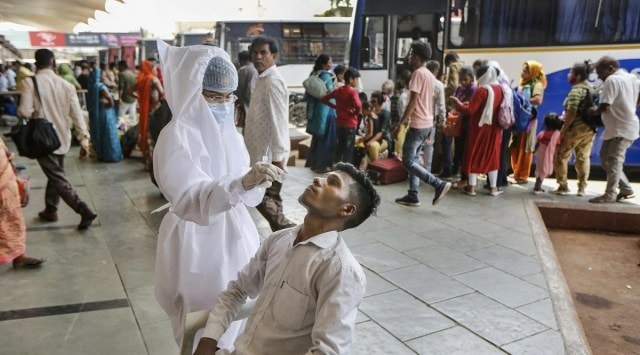- India
- International
Can you be immune to COVID-19 virus?
As US researchers study people who have completely dodged the virus despite being exposed and tested repeatedly for both the infection and antibodies, virologist Dr Gagandeep Kang says we need to identify enough uninfected, unvaccinated individuals to establish a pattern first. Only then can we have credible studies on Coronavirus resistance.
 A health worker collects a swab sample of a man for Covid-19 test, at state transport bus stand, in Ahmedabad. (PTI, file)
A health worker collects a swab sample of a man for Covid-19 test, at state transport bus stand, in Ahmedabad. (PTI, file)As the COVID-19 virus rages on, with an equally upward tick in reinfections and breakthorugh infections, what’s surprising researchers is how some people have completely dodged the virus even while their family members have been affected and have been in close proximity. And they tested negative for the virus as well as for antibodies. Are they asymptomatic carriers or are they blessed with a better immunity-boosting shield?
A Washington Post report quotes Jennifer Nuzzo, a professor of epidemiology at the Brown University School of Public Health, as saying that “Studying the genes and other biological traits of people who never catch the coronavirus could shed light on how the virus develops, or how it infects the human body and makes people sick. The findings could lead to better drugs and more targeted public health advice… One hypothesis could be that some individuals have fewer receptors in their noses, throats and lungs for the virus to bind to. Other possible explanations could be prior exposure to a related virus or simply being born with an immune system better suited to fighting SARS-CoV-2.”
According to the report, András Spaan, a clinical microbiologist and fellow at the Rockefeller University in New York, is leading research for genetic material responsible for Coronavirus resistance. He has already enrolled 700 participants and is screening more than 5,000 people who have come forward as potentially immune to coronavirus infection. This group has been repeatedly tested for the infection and antibodies.
Finding people who never had a Coronavirus infection can be tricky and difficult to ascertain considering that there could be those who had an asymptomatic infection. Analysing the development, virologist Gagandeep Kang, Professor, Christian Medical College, Vellore, says, “A high level of exposure that does not result in infection does offer the opportunity to learn more about what mechanisms are involved in protection from infection, but first we need to know the level of exposure and what else was done to prevent getting infected. In other words, is this truly resistance to infection or is it prevention of exposure? If it is found that they were not infected despite reasonable exposure, we need a reasonable number of people who have not been infected despite exposure. Then we need to investigate this group of people (who should ideally be unvaccinated since vaccination will confound protection) to identify potential mechanisms that may protect them from infection (e.g. low or different receptors, immune mechanisms etc). Then, if a potential mechanism is identified we can either validate it in a larger number of uninfected individuals (ideally they will need to be unvaccinated as well) or we can try to validate in an animal model by engineering animals with the resistance mechanism and try to infect them. This will need to be repeated for each variant.”
So this is not simple. “But science has advanced a lot and if we do identify enough uninfected, unvaccinated individuals we have the opportunity to study this. It can be done in different approaches for vaccinated individuals, but it will be even more complicated,” adds Dr Kang.
May 15: Latest News
- 01
- 02
- 03
- 04
- 05

























